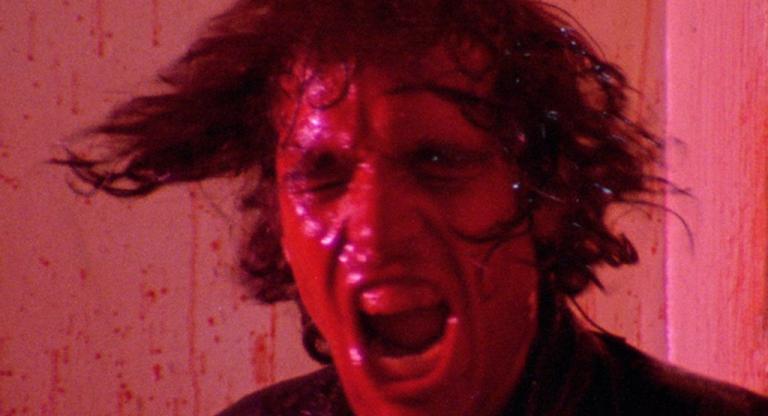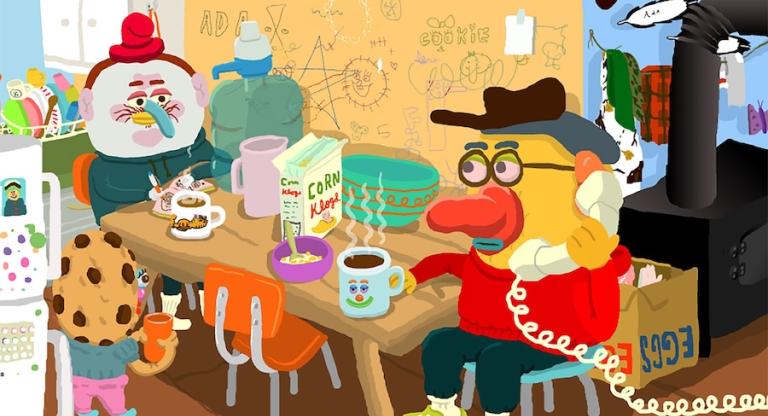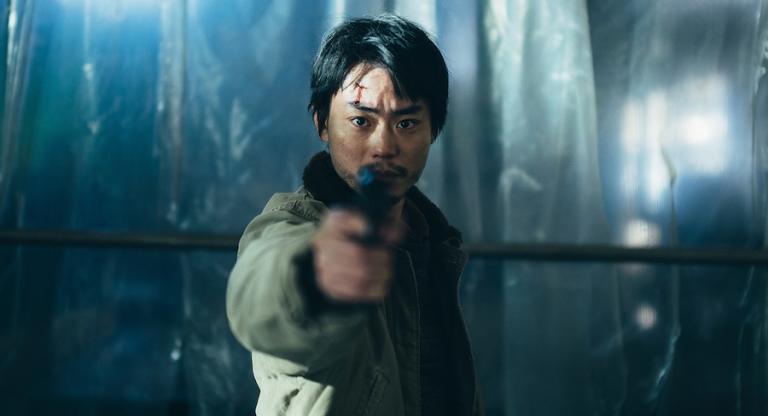Like a New York version of the Italian poet in The Decameron who exiled himself in Italy during the plague, Abel Ferrara has come back home — temporarily. Starting today, at the Cinema Village on West 12th Street in Manhattan, the man himself will be around for a nine-day series of movies he’s programmed.
Not just his own films, though he will be showing seven of those (four of them starring Willem Dafoe) — The Driller Killer (1979), Ms. 45 (1981), 4:44 Last Day on Earth (2011), Pasolini (2014), Tommaso (2019), The Projectionist (2019), and Siberia (2020). Ferrara is also presenting three midnight movies he saw in New York when they came out — Alejandro Jodorowsky’s El Topo (1970), Jim Sharman’s The Rocky Horror Picture Show (1975), and John Waters’s Desperate Living (1977), along with two films by local-hero filmmakers he’s worked with — Michael Bilandic’s Happy Life (2011) and Stephen Gurewitz’s brand-new Honky Kong. For good measure, he’s throwing in Bernardo Bertolucci’s The Conformist (1971). I spoke with Ferrara by phone for this interview, which has been edited for length if not for clarity.
Abel Ferrara: Yo, dude. It's Abel.
A. S. Hamrah: Hey, Abel, hi. It's great to talk to you.
Okay, good. Yeah. What's your name? I'm sorry.
My name is Scott.
Okay, okay. And you’re doing this for what? Who are we talking to? I mean, what's the place?
Screen Slate.
Okay. Yes. Screen Slate. Yes, yes. Okay, good.
Okay.
All right.
First of all, welcome back to New York.
Yeah. Thank you.
I'm glad you're here doing this series at Cinema Village. And I saw The Projectionist on Blu-ray during the pandemic. I bought a copy. I watched a bunch of your films during the pandemic. I wrote two things on Tommaso. Anyway, one thing I didn't get from The Projectionist was how you actually met Nick [Nicolas “Nick” Nicolaou, owner of Cinema Village, pictured up top].
We have a mutual friend who's one of our financiers, Christos Konstantakopoulos, all right? And he financed Tommaso and was instrumental in getting Siberia off the ground. And he financed The Projectionist. So he is kind of like my friend of Nick. I met Nick right before we did the movie. I didn't really know him, you know? I knew the theaters, but I didn't know him. He's like the man behind the curtain, you know.
Since you didn't know him, what made you want to make a documentary about him?
I met him, I liked him, you know? When we do documentaries, I don't want to know too much. You know what I'm saying? And then, I just got a good feel, the money was there, we shot, we went forward with it, you know? It was a very interesting journey.
It was a really enjoyable film. And I was struck by something that Nick said towards the end of the film, where he talks about how going to the movies should be a relaxing experience. Because your films aren't that relaxing. I watched Siberia a couple of nights ago and —
Yeah, and what'd you think?
I thought it was great. I loved it. I loved Tommaso too. And after I watched Siberia, I watched 4:44 Last Day on Earth again.
Really? How was it?
That is an excellent movie. I was struck by how Last Day on Earth is an apocalyptic film. Explicitly apocalyptic. But Tommaso and Siberia, they have this kind of inner apocalypse in the character going on. And I was wondering how your thoughts about apocalypse have changed since you made 4:44 Last Day on Earth ten years ago?
That's a parable, you know? I mean, it's a parable in 4:44, but then when the pandemic strikes, it hurts. Fuck. It's right there. You know what I mean? Everybody's chilling and relaxing now, but the next strain can kill everybody at 4:44, you know? The next strain of this virus, it's like everybody's dead in five minutes, okay? That's the reality, you know? Or if that don't happen, they drop an atom bomb on your fucking head, and that's the end of that, you know? And then, all these fucking countries that are creating viruses of mass destruction. So that's always kind of ... I grew up during the Cold War, where as kids they had us under the desks and scaring the shit out of us with that. So that's the thing. But you're using that stuff as a parable to your personal relationships, you know? What do they say? The most dangerous place in the world is home. And what do they say? The most dangerous thing for a woman in the world is a man, you know? And the only safe place is a movie theater.

I had to watch all your films at home, even the new ones this year.
Right. Where are you now? Where are you at?
I'm in Brooklyn.
Oh, in Brooklyn? Well, come to fucking the shows, man. You're going to come to the shows, right?
I want to. I had to see Tommaso at home. And while I was watching it, a friend called me up and her friend had just died of COVID. And she asked me to write his obituary.
Fuck me.
It was right before the scene where the daughter gets hit by the car —
I don't even say that because it's my daughter.
Yeah, I know.
That's my worst nightmare. But did the guy die?
Yeah. He died. That’s why the obituary. And the other night I was watching Siberia and a different friend called me to ask me to write another obituary for a different guy who died.
Well, stop watching my movies, dude, because the next one would be me. You're writing my obituary.
No way, but I'm worried about watching another one at home. I only want to see them in movie theaters. So the series you're doing over at Cinema Village is you're showing a bunch of your own films —
Yeah. We're showing some movies that I made in New York. This is what we doing: we're celebrating the reopening of the Cinema Village and of New York. So we're going to show movies that I made that have shown there: Ms. 45, The Driller Killer, okay? And other movies that I saw there or down the block somewhere in New York, you know what I'm saying? So that's the story with Desperate Living and El Topo and The Conformist and, uh, what’s the other one? Rocky Horror. It's about other movies, too. It's not just about my movies, you know? I'm showing some old shit, I'm showing some new shit, I'm showing some films by the guys I've worked with. It's a whole fucking deal. Let’s get back to the philosophy of movies.
Okay. I was watching Driller Killer again, which is a great film. The paintings in Driller Killer that your character does reminded me of the paintings in 4:44. And Driller Killer already had this apocalyptic vision of New York City. Pretty much there wasn’t that much of a difference between them in a way, with Dafoe on the roof in 4:44. And there's this consistency to your films —
Well, I mean, 4:44, you know? I mean, it's the same guy shooting them. I mean, Kenny shot those movies, so he's got his own thing, you know? He's a Vietnam vet, so he's got his own apocalyptic vision of the fucking world. You know what I mean? He sees things, you know? He sees everything, you know? There is the parallel and you got a parable. The world's coming to an end, so you got a certain darkness. In Driller Killer, this guy, it's a personal apocalypse. His world's come to an end. But at the time in '77, you know? I mean, it's funky out there now, but the city was really like, there was no cops. It's like the cops were literally on strike, okay?

Yeah, people want them to go away now. That was such a good portrait of the city at that time even though it wasn't explicitly made to be that.
We shoot in the streets, you know? The bottom line is we shoot in the streets. These other people really ... You can walk out in New York, you're fake this and fake that. At the end of the day, even if our film sucks, it's a sociological study, you know? You could forget about the actors and the action in the middle. Look at the edges and at least you'll get a sociological reality, as opposed to these other movies that maybe they're better in the middle, but their edges are all bullshit. So all those movies you've seen about New York, or made up in New York, you don't even see New York, you know? Here, you can see the fucking city. Even if you don't want to look at the movie, you can really see, Wow, look at that street, what the fuck that looked like because it's a matter of that street at that time. You know what I mean?
That is really palpable, yes. And watching at home during the pandemic late at night, it gives a real vibe.
Please don't kill anybody.
What?
Don't kill nobody.
I don't own a power drill.
They sell one. They sell one right across the street.
I thought it was a very restrained film, in a way. He doesn't kill anybody with a drill for like 36 minutes into the film.
It was a warm-up, yeah. Leading up to the big, big payoff, right?
Yeah. So in these films like Siberia —
It's the ultimate cum shot.
What was that?
No, it's a joke. Like you fucking get through ... You know.
Yeah, yes. So The Projectionist seems like a real ... it's a very positive film. It's a happy view of New York City and going to the movies.
Well, Nick, he's got a big-time positive attitude. And he believes in the movies, he believes in the cinema. And he's put his money where his mouth is, you know? He just walks the walk, you know what I mean? He's doing it. He's out there now. I mean, he's fixing his popcorn machines, he's putting the fucking place back together, he's bringing the theaters back to the way they looked. He's all in, man, you know? That energy's coming back and he's bringing it back .
Yeah. I hope so. Before the pandemic, it was so great to see movies everywhere in New York City. And now, it's a lot of virtual theaters.
I think now people want to get the fuck back outside, right? I mean that's the thing, this is the other thing about this. It's like, get the fuck out now, you know?
Yeah, I want to get back outside so I can go into a movie theater.
Who wants to watch a movie at home now that you could watch it in the theater, right? You want to bust the fuck out, man. It's time to. That's the point of this festival. Get your ass out and come see a movie. It's only five bucks a fucking show, okay? And if the theater for the next show isn’t full, your ticket gets you into that show too. So hang out all day. You can get into another movie. No fucking excuses. Get off your ass. Come see this fucking shit. 12th Street between University and Broadway.
I know where it is.
I'm telling you to tell everybody in the fucking world. I know you know.

So this is all about going to the movies, getting back into the theater, seeing your films, seeing something that you liked at the time when it came out. But every day we read these stories about, like, Steven Spielberg or whoever signing a deal with Netflix. He's going to make films for streaming services.
Yeah. Fine. Good luck, you know? It's fine, I'm happy. Any fucking filmmaker could do anything anywhere. You know what I mean? It's just too difficult to try to get your shit off. That's what he wants to do? Great. I'm happy for him.
Yeah. But last year four feature films came out that you made. So you seem to be able to do it more fluidly or something than he is.
Well, his movies come out.
They come out, but he obviously thinks that you have to do this for Netflix now.
Well, there might be a lot of reasons why he does it. You know what I'm saying? I mean, it's not that ... I doubt Steven has got a fucking problem. Yeah, Steven Spielberg lost his house, can't get a job. Tell him to call us up. He could work on our stuff.
He can do whatever he wants, but he wants to do stuff on Netflix.
Big deal. What are you going to do? Hang him? Hang him upside fucking down? And crucify the poor guy? Let him fucking do what he wants, you know? I'm saying, fine. Let him, if that's what he wants to do. Good luck, you know? At the end of the day you're going to be judged by the movie, man. The movie, whether it’s on Netflix, or you put it in Yankee Stadium, he's going to make a fucking movie. So everybody should be digital? What difference does it make? He's either going to make a fucking strong movie or it ain't going to be. So that's, you know, I hope it’s fucking good.
I hope they're good too because I don't like to see bad movies.
Well, you get paid to see them.
I pay to see most of them.
Oh, really?
Yeah.
Thank Buddha for you, man.
The reason I was asking about that was because I was wondering if ... You're so prolific, you're making great films still. Would you want to do that kind of deal where your stuff just goes straight to streaming? Or do you want to have it released theatrically?
I'm worried about making a fucking movie, you know what I mean? The coming out of it is, you know ... But with a movie, I got a movie, it could come out tomorrow, ten years from tomorrow, it could get projected on the moon 200 years from now, you know what I mean? It could be internetted to an igloo in the North Pole. I'm not stressing about that side of it. You see what I mean? I'm not in on those kinds of deals. I don't have to make those choices. I'm just trying to get the motherfucker shot. Then, we'll worry about what the fuck's going to happen. You know what I mean?
I'm glad you're doing the series at Cinema Village.
Yes. So come to ... I'll see you Tuesday night, all right? I'm going to introduce the film.
What's the music you're doing? Are you doing it in Cinema Village, too?
Yeah. We're playing, you know? Joey's the composer of all the movies, so he plays, and then we try to fuck them up. We'll be there.
So he's going to be right there in the theater at Cinema Village?
He's going to be right there playing the shit you hear. He's going to do it right in front of you. You're going to see the man himself with his tattoos, the shades, his fucking gloves, his whole fucking deal, all right? So, good talking to you. Thanks for putting all the shit up there on there.
Yeah. Great to talk to —
[click]
All the shit is up on Screen Slate's series page for Abel Ferrara's Cinema Village, which runs today through July 8. View a series trailer.



